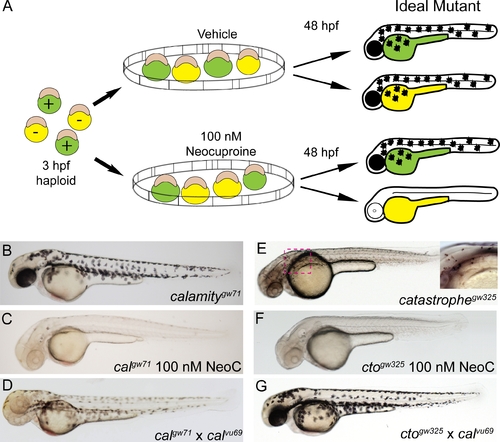Fig. 1
- ID
- ZDB-FIG-081124-1
- Publication
- Madsen et al., 2008 - Zebrafish mutants calamity and catastrophe define critical pathways of gene-nutrient interactions in developmental copper metabolism
- Other Figures
- All Figure Page
- Back to All Figure Page
|
Chemical genetic screen for zebrafish mutants sensitive to copper deficiency. (A) Diagram outline of the sensitivity screen. Haploid embryos are either wild-type (green) or mutant (yellow) for any given ENU-induced mutation. These embryos were placed in vehicle or 100 nM neocuproine (neoc) at 3 hpf and allowed to develop until 48 hpf when they were screened for loss of melanin pigmentation in drug only. The ideal mutant is demonstrated on the right where mutant (yellow) embryos have no pigment only upon treatment with neocuproine (B–C) The first mutant isolated has full pigmentation without neocuproine (B) and loses all pigmentation upon treatment with 100 nM neocuproine (C). (D) This mutant does not complement a known allele of the mutant calamity, establishing it as a new allele of the same gene atp7a. (E–F) The second mutant has reduced, punctate pigmentation without drug treatment (E) but loses all pigmentation upon treatment with 100 nM neocuproine (F). (G) The second mutant fully complements calamity. Therefore we have isolated a new mutant which we have called catastrophe. |
| Fish: | |
|---|---|
| Condition: | |
| Observed In: | |
| Stage: | Long-pec |

